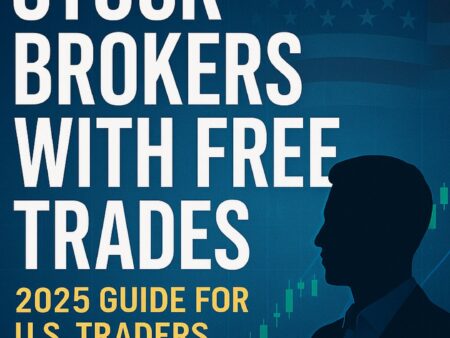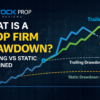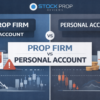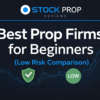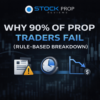In the ever-evolving world of online stock trading, Robinhood continues to spark debate among beginner and intermediate traders in the United States. Once hailed as a revolutionary platform for commission-free trading, Robinhood has grown massively over the past decade—but it’s also faced scrutiny. So, is Robinhood still a top choice for new traders in 2025?
In this honest Robinhood review, we’ll break down everything you need to know—features, pros and cons, pricing, ease of use, and how it compares to other stock brokers USA. We’ll also touch on an exciting alternative for those looking to trade with limited capital: prop firms.
Why Robinhood Still Matters in 2025
Choosing the right broker is one of the most important decisions a trader or investor can make. For beginners, the platform should be simple and cost-effective. For intermediate users, speed, functionality, and access to real-time data matter.
Robinhood targets both ends of this spectrum:
- Beginner-friendly mobile app
- Zero commission on stocks, ETFs, and options
- Crypto trading without extra apps
- Fractional shares and recurring investments
But how does it stack up today against other best trading platforms?
Robinhood at a Glance
| Feature | Details |
|---|---|
| Stock & ETF Commissions | $0 |
| Options Trading Fee | $0 (with Robinhood Gold) |
| Crypto Trading | Yes |
| Margin Trading | Available with Robinhood Gold |
| Account Minimum | $0 |
| Platform | Mobile and Web |
| Customer Support | Email and Live Chat |
Key Features of Robinhood
1. Zero-Commission Trades
Robinhood was the first to introduce commission-free trading on U.S. stocks and ETFs. This move forced the rest of the brokerage industry to follow.
2. User-Friendly App
The Robinhood mobile app is designed with simplicity in mind. Users can easily buy and sell stocks, options, and crypto in just a few taps.
3. Robinhood Gold
For $5/month, users can subscribe to Robinhood Gold:
- Access to margin trading
- Level II market data from Nasdaq
- Bigger instant deposits
- Research reports by Morningstar
4. Crypto and Fractional Shares
Robinhood supports trading in popular cryptocurrencies like Bitcoin, Ethereum, and Dogecoin. You can also invest in fractional shares—perfect for trading for beginners with smaller budgets.
Pros and Cons of Robinhood
✅ Pros
- $0 commission on trades
- Easy-to-use mobile and desktop platform
- No account minimum
- Crypto trading available
- Fractional shares for as little as $1
- Quick onboarding process
❌ Cons
- Limited asset types (no mutual funds or bonds)
- Basic charting and analysis tools
- Past controversies and outages
- Customer support can be slow during peak hours
How Does Robinhood Compare to Other Brokers?
| Broker | Stock/ETF Fees | Options Fees | Crypto | Best For |
| Robinhood | $0 | $0 | Yes | Beginners, mobile traders |
| Webull | $0 | $0.55 | Yes | Active traders |
| TD Ameritrade | $0 | $0.65 | No | Advanced tools, education |
| Fidelity | $0 | $0.65 | No | Long-term investors |
| Interactive Brokers | $0 | $0.65 | Yes | Global and professional users |
Who Should Use Robinhood?
Robinhood is best for:
- New traders learning the basics
- Investors looking to avoid commissions
- Users focused on mobile-first experiences
- Anyone who wants access to both stocks and crypto
It’s not ideal for:
- Serious day traders needing advanced tools
- Investors who want access to mutual funds or retirement accounts
- Traders who require phone support
Pricing Breakdown
| Service | Cost |
| Stock & ETF Trades | $0 |
| Options Trading | $0 |
| Robinhood Gold Subscription | $5/month |
| Margin Interest (Gold) | 12% APR (varies) |
User Experience and Security
Robinhood offers a streamlined experience but may feel “too simple” for traders who want more data and functionality.
Security:
- Two-factor authentication
- SIPC protection up to $500,000
- 256-bit encryption
Support:
- In-app live chat
- Email support
- Help center with FAQ and guides
Alternatives to Robinhood
Looking for something beyond Robinhood? Explore these other options:
- Webull: Better charting tools and after-hours trading
- Fidelity: Great for retirement and research
- Interactive Brokers: Lower margin rates and global market access
- Prop Firms: For traders with skill but little capital
Many traders are also exploring prop firms in 2025 — these firms fund traders, so you can trade with little or no deposit. Prop firms help you get funded to trade remotely, and are becoming a smart alternative for capital-limited traders.
Learn more about how these work in our full breakdown on the best trading platforms and stock brokers USA.
FAQs About Robinhood (2025)
1. Is Robinhood really free to use?
Yes. Robinhood offers commission-free trading on stocks, ETFs, and options. There are optional fees for Robinhood Gold.
2. Can I trade crypto on Robinhood?
Yes, Robinhood supports popular cryptocurrencies like Bitcoin and Ethereum.
3. Is Robinhood good for beginners?
Absolutely. The platform is simple, intuitive, and ideal for first-time investors.
4. Are there any hidden fees?
No hidden trading fees, but Gold users should be aware of margin interest and the $5 monthly subscription.
5. Does Robinhood offer retirement accounts?
Robinhood currently does not support IRAs or other tax-advantaged retirement accounts.
6. Can I use Robinhood for day trading?
Yes, but frequent traders should be aware of pattern day trading rules and Robinhood’s limited charting tools.
7. Is Robinhood safe to use?
Yes. The platform is regulated and offers insurance protection through SIPC.
8. What’s better than Robinhood?
Platforms like Webull and Interactive Brokers offer more advanced tools. Or consider prop firms if you’re short on capital.
Final Thoughts
Robinhood still holds its place among the top low commission brokers in the U.S. Its sleek interface, commission-free trading, and growing list of features make it a good pick for trading for beginners.
But if you’re looking to level up or start trading without risking your funds, there are alternatives. Want to start trading without using your own money? Explore the top-rated stock prop firm at tradethepool.com.
